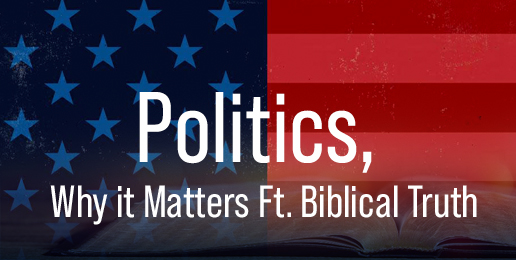
Politics, Why it Matters by Andrew Gamble is a short book on politics. The preface and first chapter talk about human conflict, flourishing, and peace, and how politics weaves them together. Gamble says that every human interaction involves politics because politics governs and guides our interactions.
People tend to disengage and avoid politics because they’re complicated and overwhelming, and require people to step outside a desire for total personal autonomy.
Despite all this, Gamble says, it’s important to be involved because bad political systems can absolutely wreak havoc on human life and interaction.
I had to read the first 21 pages of Gamble’s book for a class this semester, and something he said caught my eye. I think it sums up the theme of the chapter well. He said,
“Politics is everywhere. It underpins the lives we lead. With all its shortcomings, it is only through politics, and different kinds of politics, that some of the pressing problems we face can be addressed.”
It’s an interesting thought, but from a Christian perspective incomplete and inaccurate. Politics as described by Gamble offers a human solution to a spiritual problem. On its own, politics can help but will never be able to thoroughly address the pressing problems we face.
Gamble seems to somewhat recognize this. Later in the book, he says,
“To many citizens, democratic politics, if not oppressive, remains grubby, disreputable, boring, remote, alienating, and never seems to change much, or when it does only gradually and in small incremental ways.”
John Adams said,
“Our Constitution was made only for a moral and religious people. It is wholly inadequate to the government of any other.”
This gets closer to the heart of the issue.
Politics has to be based on some moral ideology or other. Otherwise, who’s to say what the problem is and whether it is actually an issue? For example, why is it important to help those in poverty? Because they’re fellow human beings. But why are humans important and why is it good to help them?
Politics ends up legislating ideology. God created the world to work in a certain way and one of those ways is for humans to be in a relationship with Him and each other. Sin broke those relationships.
Romans 1 paints a clear picture of the consequences. Politics, when not in submission to God, serves as a human effort to stave off the lawlessness and chaos that comes from broken relationships. It’s sin or grace that underlines our interactions with each other.
It’s a spiritual problem with a spiritual solution. Only through Christ, His death, and His resurrection can broken relationships be mended and the pressing problems we face be solved.
Government and the politics that surround it are wonderful gifts from God. When working rightly, politics is “not a terror to good conduct, but to bad” (Romans 13:3a). It can be used to right terrible evils. But it’s also broken by sin and undermined by broken relationships.
This is why even a democratic government (or a democratic republic like ours) can feel
“if not oppressive… grubby, disreputable, boring, remote, alienating,” as Gamble said.
Politics matter and Gamble provided some good, thought-provoking points. But politics—a human solution—will never be able to fully address our spiritual problem.





















